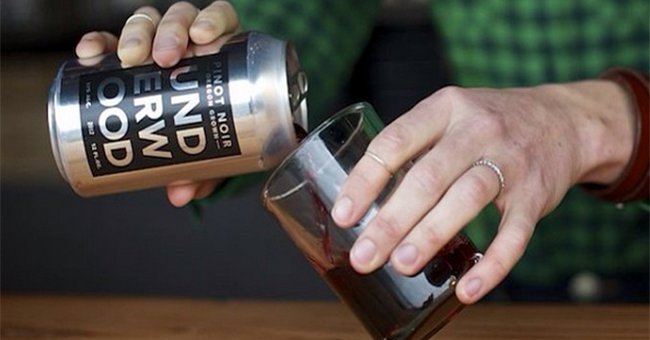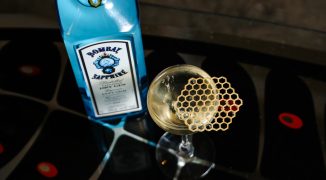Any ancient Roman or working mom in the ‘80s could tell you there’s more than one way to store and pour wine. The former relied on amphorae (terracotta jars also handy for holding ashes) while the latter loved White Zin in cardboard crates. So when Ryan Harms, owner of Oregon’s Union Wine Co., decided to sell his wine in aluminum cans, it wasn’t the vessel that broke new ground. It was the quality of the juice he put inside.
“It’s not wine in a box, which implies the cheapest wine brought to the masses,” says Harms. “The wine that we can is the same exact blend that we put into bottle.” His canned lineup features three blends from the company’s Underwood label, including a Pinot Gris, a Syrah-inflected rosé, and a Pinot Noir – the region’s flagship varietal at the heart of Harms’ rebel winemaking mission.
Harms opened Union Wine Co. in 2005, on the outskirts of Portland, with the goal of busting the myth that Oregon wines (Pinot Noir, in particular) had to be expensive. “Oregon’s reputation has been built by pioneering winemakers who focused on quality from day one,” he says. “In the long run, this was great for Oregon’s quality reputation, but limiting for consumers who couldn’t experience Oregon wine due to higher price points.” From the outset, Harms made value a priority equal to craftsmanship, focusing on the creation of brightly fruited, easy-drinking blends that still bear the fingerprints of classic Oregon Pinot.
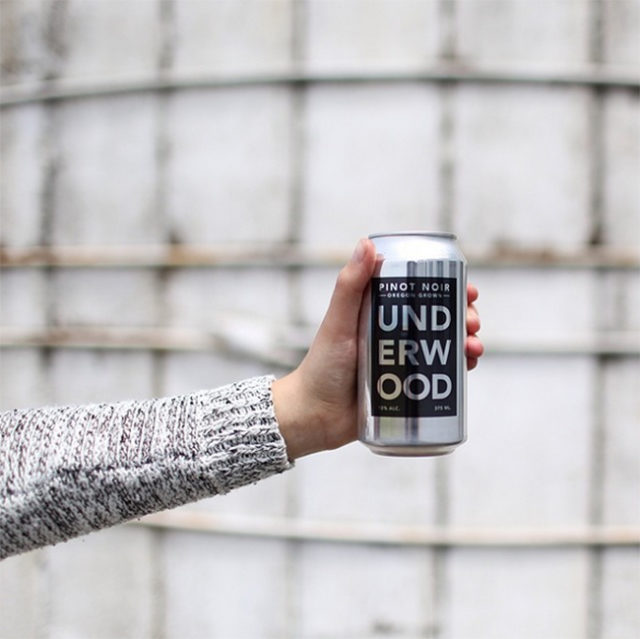 Union Wine Co. succeeded in making wine more portable and picnic-able.
Union Wine Co. succeeded in making wine more portable and picnic-able.
It’s this big-tent, snobbery-resistant approach to wine that primed Union Wine Co. to experiment with new packaging. Given that even the bottled wines want to be consumed straight away, why not make them even more portable and picnic-able? Harms tried other containers, but found the 12 oz can to be “a great intersection between form and function.” It costs 40 percent less to package than glass of the same size, it’s recyclable, and it eliminates any intimidation that might come between the booze and its drinker. For Harms, that last idea is central to the disruption — or “beerification” (his word) — of the wine world, and he likes being one of its pioneers.
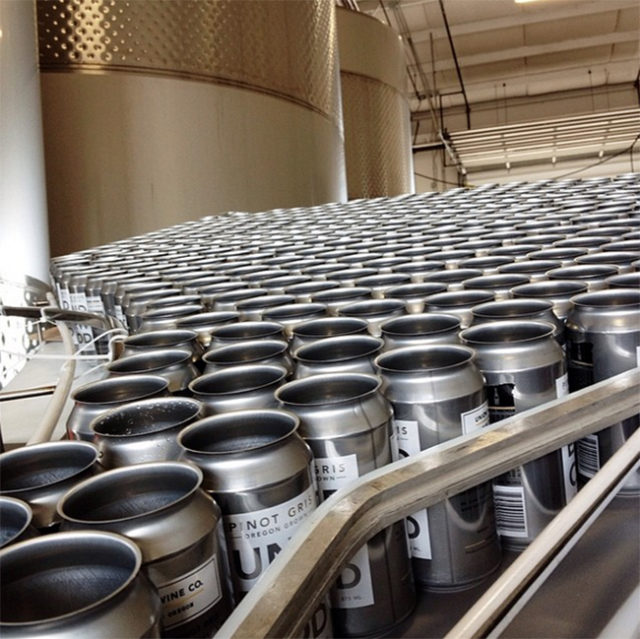 Union Wine Co. seeks to make wine as accessible as beer.
Union Wine Co. seeks to make wine as accessible as beer.
“Many people are frustrated with arcane processes and old badges of sophistication,” he says. “We can see that happening all around us. Quality in craft is not necessarily tied to traditional concepts of sophistication.” And even if some drinkers do graduate from the can to full-blown wine geekdom, as long as they stay true to Union’s “Pinkies Down” ethos, the company is happy to kick off their journey.
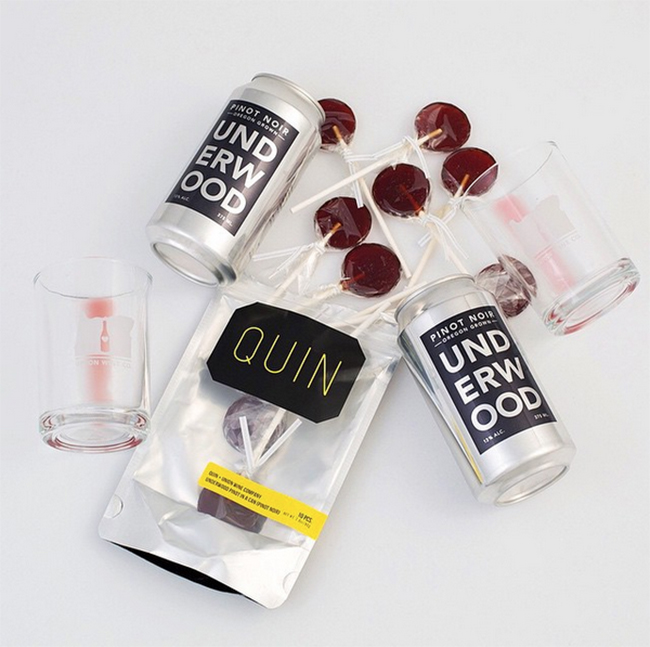 While Underwood canned wines may be a gateway to sophisticated wine tastes, they remain true to their fun-first spirit, collaborating with the likes of Quin Candies.
While Underwood canned wines may be a gateway to sophisticated wine tastes, they remain true to their fun-first spirit, collaborating with the likes of Quin Candies.
As for folks who are already passionate about wine? Union knows the cans can entice them, too. Harms launched the cans at the 2013 FEAST Portland, a festival known to draw chefs, winemakers, and bartenders who get giddy about new ways of eating, drinking, and blurring old high brow/low brow boundaries. While dedicated attendees dig innovation, they’re not strangers to serious wine – and yet they’re the ones who helped the concept take hold.
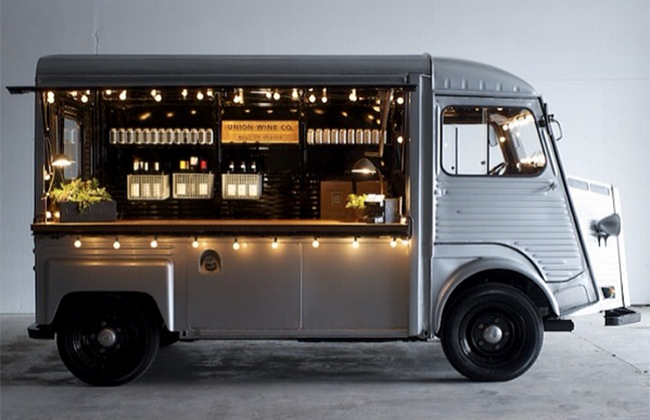 The Union Wine Co. wine truck helped get the word out about their mission to make snobbery-resistant wine.
The Union Wine Co. wine truck helped get the word out about their mission to make snobbery-resistant wine.
“When we first launched the idea… there was an expectation that some people might find it interesting, but we really didn’t have an expectation that this was going to become a ‘thing’,” Harms says. Of course, their retrofitted “wine truck” helped draw attention – but the fact that the wine in the cans is actually good made both the geeks and the newcomers start to seek out the six packs for all of their golf courses, outdoor movies, and lawn-lounging needs.
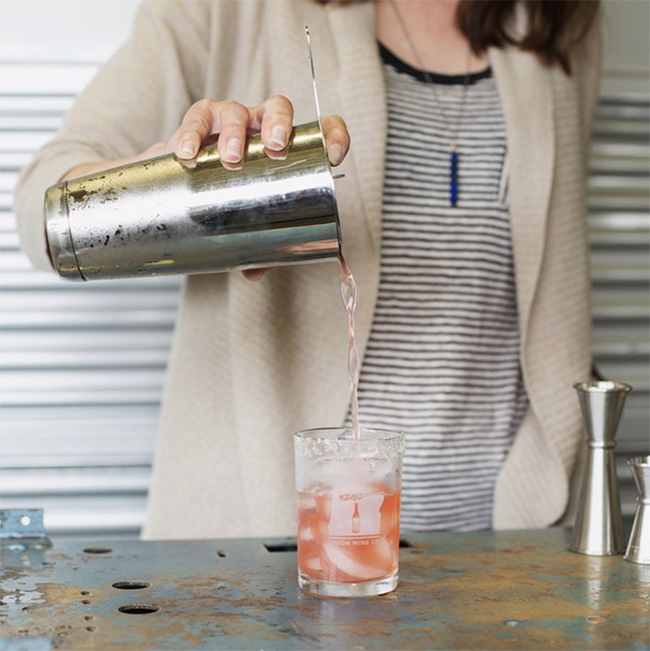 Union Wine Co. is experimenting with wine cocktails like a rosé margarita spiked with strawberry juice.
Union Wine Co. is experimenting with wine cocktails like a rosé margarita spiked with strawberry juice.
While the current cans (and their bottled counterparts) continue to expand to new markets, Union is working on new rosés, a canned sparkler, and potentially even some wine-based cocktails. Early experiments have made for a killer Riesling Americano (with Campari, vermouth and soda) and a rosé margarita spiked with strawberry juice that aims to hold its own amongst even the craftiest of cocktails.


